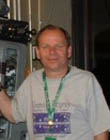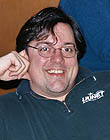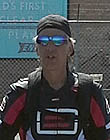|
|
This topic comprises 2 pages: 1 2
|
|
Author
|
Topic: Lamp strikes, house lights go out
|
Thomas Pitt
Master Film Handler

Posts: 266
From: Leeds, West Yorkshire, UK
Registered: May 2007
|
 posted 02-25-2010 07:41 AM
posted 02-25-2010 07:41 AM




At my nearest theater, I've noticed that whenever the lamphouse strikes, the auditorium lighting for that screen briefly dims or even turns off - only to come on again when the bulb is working. This can also happen (to a lesser extent) if the lamphouse for the adjacent auditorium strikes.
I'm assuming this has something to do with the power surge caused by the lamphouse turning on - but is this effect 'normal' for a multiplex? Is there anything that can be done to stop or minimize the effect? In this theater in particular, all the lighting comes from sconces on the walls, and to plunge the audience into total darkness for a second or two doesn't seem very professional...
Incidentally, they used to dim the house lights a little bit when the advert reel started, then turn the lights off at the start of the trailers. Now, the lights remain at full brightness until the start of the trailers, at which point they dim and turn off.
| IP: Logged
|
|
|
|
|
|
|
|
|
|
|
|
|
|
|
|
|
|
|
|
|
|
|
|
|
|
|
|
|
|
|
|
All times are Central (GMT -6:00)
|
This topic comprises 2 pages: 1 2
|
Powered by Infopop Corporation
UBB.classicTM
6.3.1.2
The Film-Tech Forums are designed for various members related to the cinema industry to express their opinions, viewpoints and testimonials on various products, services and events based upon speculation, personal knowledge and factual information through use, therefore all views represented here allow no liability upon the publishers of this web site and the owners of said views assume no liability for any ill will resulting from these postings. The posts made here are for educational as well as entertainment purposes and as such anyone viewing this portion of the website must accept these views as statements of the author of that opinion
and agrees to release the authors from any and all liability.
|

 Home
Home
 Products
Products
 Store
Store
 Forum
Forum
 Warehouse
Warehouse
 Contact Us
Contact Us




 Printer-friendly view of this topic
Printer-friendly view of this topic










![[Wink]](wink.gif)





![[Big Grin]](biggrin.gif)



